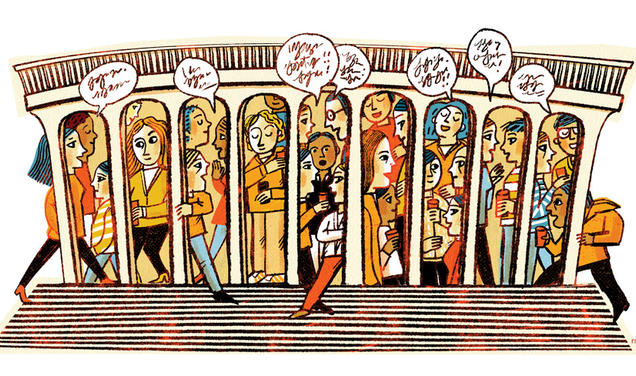
As corrections go, this one could not have been more polite — or more succinct. In our June 3 issue, we had written: “Once you think ‘car,’ your brain automatically blocks out everything else and hones in on that specific shape.”
Our correspondent gently set us right: “Homes, not hones.” He signed it: “Pedantically, David Galef ’81.”
Galef, a novelist, poet, and professor of English at Montclair State University in New Jersey, was right, of course. In PAW’s defense, I emailed a 2012 New Yorker article about hones and homes published after that magazine had been accused of committing the same sin. The New Yorker found that, since 2003, “hone in” has had its own entry in Webster’s dictionary, as an alternative to “home in,” and its use was attributed to George Plimpton. Aha! Not guilty! Of course, Plimpton might have made a mistake, as we did. But it made me feel better.
I felt especially lucky that this exchange introduced me to Galef, who responded with a funny but educational essay called “Diction Slips” about misused words. His piece begins with a conversation he had with a student who was, well, close but not quite correct in her diction. Should it be tortuous or torturous? Flout or flaunt? Insurance or assurance? Here, too, Galef is generous: “Is there any refuge from these diction slips?” he writes. “Well, at least they stem from attempts to broaden one’s vocabulary.”
Galef’s essay originally ran in the magazine Verbatim. In an effort to start PAW’s publishing year on the right foot, we happily republish it at paw.princeton.edu.
His letter, however, was also a reminder that many Princeton alumni read PAW very closely. Readers don’t always agree with our decisions and coverage — and when we hear from them, we consider it a good thing that they care enough to write.
Regular readers will note some changes in this issue. To illustrate the pursuits of more Princeton graduates, the Princetonians section now begins with a full-page photo of an alum. We hope that the image will tell the alum’s story better than words could.
In addition, PAW’s back-page history column — That Was Then — will now be written by John Weeren, a former assistant University archivist who founded and directs a writing program for Princeton staff members. For two years, Barksdale Maynard ’88 has used the column to tell the stories of some of Princeton’s most interesting but little-known moments. Maynard’s many fans will continue to find his work in PAW this year. Weeren’s first column — about an unpleasant student protest that took place when Woodrow Wilson 1879 was an undergraduate — is found on page 80.
We hope you enjoy what PAW offers this year. Either way, we’re confident you will let us know.










0 Responses